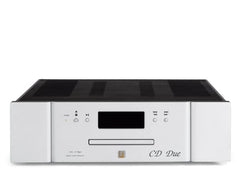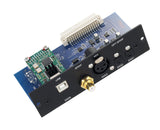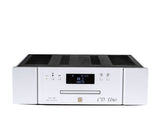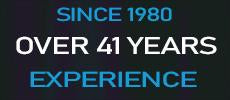Unison Research Unico CDDue CD Player
Please Note - We do Not stock this item. Please email for availability
Unico CDDue is high level DAC with integrated CD reading system, is flexible and customizable in use. CDDue combines the Unison Research sound quality and the possibilities offered by digital systems. Via an external source or a computer allows playback of digital audio PCM and DSD in all formats and sampling rates currently available.
A look at the back of the unit allows you to realize the number of inputs and outputs. Digital inputs available: USB, S / PDIF, AES / EBU and Toslink ™, what you don’t see is Bluetooth ™ receiver that allows playing music , from mobile devices, without cables.
The output stage, as in Unison Research tradition use valves: two balanced outputs and two unbalanced. CDDue use 4 ECC83 in an innovative totem pole configuration with balanced input, this particular circuit allows high immunity to power supply noise and brings together the “triode” sound and drive capability of cathode follower.
Aesthetically it differs from past productions, CDDue has a new front also used in the Unico 150 and Unico 90, white LEDs and white display
Features
The Unico CDDue is simple to use but feature-rich.
The new graphic display use white OLED technology for excellent visibility in all lighting conditions and from any angle, it has a resolution of 128 x 64. The Display function allows you to turn off the display pushing a button and enjoy listening without illuminations. The display shows the most important information in large fonts, and features active in smaller fonts
To understand how the product is flexible lets begin from inputs available:
USB
The USB input of the CDDue through latest generation D/A converter can manage signals up to 384kHz PCM and DSD until 11,2896MHz, practically all formats and sampling rates currently available.
Bluetooth
CDDue is equipped with a Bluetooth connection that allows listening to music from any smartphone. The use of this connection is quite simple, because the CDDue is seen from your smartphone as a headset device.
Easy to use, how to connect a Bluetooth headset to the smartphone.
Digital inputs
Coaxial S / PDIF, balanced AES / EBU and optical Toslink
You can connected to the CDDue external digital sources (satellite receivers, digital recorders, digital mixers, etc.) There are three digital inputs on the panel .These inputs accept up to 192kHz and 24 bit (96 kHz and 24 bit the optical input). Note that the coaxial inputs accept balanced and also transfer signals encoded DSD64 DoP.
CD
The reading mechanics use audio unit with a sleek drawer "slim" can only read audio CDs. The mechanism is enclosed and shielded by a thick metal cover.
Digital outputs
CDDue digital outputs include coaxial S / PDIF, balanced AES / EBU and optical Toslink. On all outputs we will find the digital signal of source in reproduction
DAC board and features
The CdDue is designed to separate the digital section from the analogue one, the DAC section contains 11 stabilized power supply to ensure a clean and distinct to each device on the board. The most sensitive power supply are obtained by putting more stabilizers in cascade: the first filter and stabilizes the power supply, the second, lower voltage stabilizes and removes any residual noise. All this deployment of power is needed to put the DAC in the best working conditions and allow maximum performance of the chip.
The current-voltage converters (AD8597 / AD8599) are "ultralow distortion" and "ultralow noise" and use quality components: Wima capacitors and Vishay resistors.
The use of an FPGA allows faster response times in the management of the digital data ,allow specialized functionality and greater power than DSP processors.
The ESS Sabre DAC ES9018K2M with jitter eliminator, allows an exceptional signal to noise ratio of 128 dB and a low distortion 0.0003% the timing system is given by a quartz oscillator with high precision and low phase noise.
It is possible to select from three different types of digital filter:
F1 filter high slope and linear phase
F2 filter high slope and minimum phase
F3 filter low slope and linear phase
The three filters have characteristics which favor certain characteristics of the sound (temporal coherence, phase coherence or impulse response) and this allows the user to select the digital filter that best suits the installation, registration and your tastes.
You can reverse the absolute phase of reproduction in function of your system.
One more functionality is the possibility to bypass tube section for have a “ solid-state” sound
Valves Output stage :
The tube stage uses two stabilizers, one for the anodic supply and one for the filaments.
The path of the masses of signal and power are been design in a particular way, are combined in a stellar like connection in the center of the board, from this point start of the mass connection to DAC board in order to reduce noise and disturbances .
Wima capacitors are used for input of this stage and capacitors Mundorf for the output, two capacitors Wima are positioned a few centimeters from the valves for added noise filtering and as reserve of immediate energy. The proximity of the capacitors avoids that the variations of currents on long path that may propagate noise or mutual interference between the channels.
For a DAC of such performance has been designed an innovative circuitry, the result of extensive research and a long aging in the listening room, it presents the sonic performance of the triode with an output impedance of a cathode follower stageThe converter stage provides a balanced output with high output voltage to maintain a high signal to noise ratio and low distortion
The tube stage uses a totem-pole circuit in which each of ECC83 triode is piloted by a phase of balanced signal coming from the DAC. With this device you can keep low distortion and high noise immunity.
The sizing was performed to keep the output impedance more symmetrical as possible in the rising edge and falling edge of the signal. The totem pole circuit is also used in the One and 150 in the Only 90 of the same line of CDDue
Specifications
Digital Inputs
1 x USB
Standard: USB 2.0 Audio Class
frequencies: 44.1, 48, 88.2, 96, 176.4, 192, 352.8, 384, DSD64, DSD128, DSD256 Ready
Resolution: 16 to 32 bits
1 x S/PDIF
Sensitivity: 0.5Vpp on 75 Ohms
Sampling frequencies: 44.1, 48, 88.2, 96, 176.4, 192
DSD64 (DoP)
Resolution: 16 to 24 bits
1x AES/EBU
Sensitivity: 2Vpp on 110 Ohms
Sampling frequencies: 44.1, 48, 88.2, 96, 176.4, 192
DSD64 (DoP)
Resolution: 16 to 24 bits
1x Toslink™
Sampling frequencies: 44.1, 48, 88.2, 96 (176.4 and DSD64-DoP with high efficiency transmitters)
Resolution: 16 to 24 bits
1 x Bluetooth™ Receiver
Standard: BT 3.0
Profiles: A2DP, SSP (HID supported with Android smartphones through SPP)
Sampling frequencies: 44.1kHz, 48kHz
Resolution: 16 bits
Digital Output
1x S/PDIF
Output voltage: 0.5Vpp on 75 Ohms
1x AES/EBU
Output voltage: 2Vpp on 110 Ohms
1x Toslink™
Transport
8829CD-KHM DVD-Loader , Only audio CD
Display
128 X 64 White OLED graphic display , (can be turned off)
Digital to Analogue Stage
DAC:
ESS Sabre ES9018K2M with jitter eliminator
SNR: 128dB (0dBFS, 1kHz, 192kHz, “A”
weighted)
THD+N: 0.0003% (0dBFS, 1kHZ, 20Hz-20kHZ)
Timing: low phase noise, high precision crystal
oscillators
IV converter:
AD8597/AD8599 ultralow distortion, ultralow noise, use high-quality components like wima capacitor and wishay resistor
Output Audio Stage
Number of channels:
2
Output stage:
Duble Triode, pure class A differential Totem-pole
Valve complement:
4 x 12AX7/ECC83
Output audio connectors:
1 x RCA stereo
1 x XLR stereo
Optional buffer:
AD8597/AD8599 output buffer can be activated
by remote control normally bypassed by relay
General Specification
Remote control:
1 x Infrared in wood and metal
Disc Formats:
CD Audio
Weights & Dimensions
Power consumption: 100W max
Dimension: 45cm x 38cm x 13cm
Net weight: 10Kg












